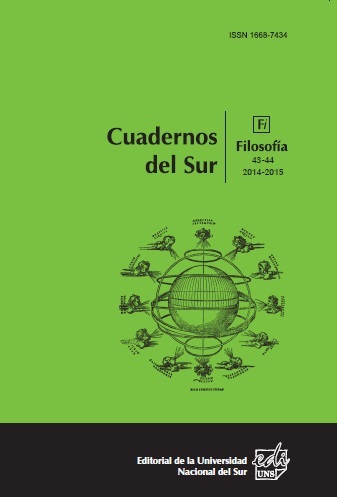Lo social en La condición humana de Hannah Arendt: posibles aperturas políticas
Keywords:
Social factors, Productive labor, The WorldAbstract
In The Human Condition, Arendt establishes the conceptual framework of her political theory and it is also there where she presents a mainly negative vision with respect to social concerns. This German authoress blames the social sphere for the disappearance of the necessary public space for political action. We will dedicate ourselves to refute the alleged negativity by which Arendt addresses social factors in the text. It seems that within the realm of social concerns, different aspects, both positive and negative, can be identifi ed. Those social factors, through their main activity –the productive labour–, create a world that would achieve the necessary stability for action, despite a constant change. This would allow us to think about the possible political openings of that area.
Downloads
References
Arendt, Hannah (1992), Sobre la revolución, Buenos Aires, Siglo XXI, [trad. de Pedro Bravo].
----- (2002), “Little Rock. Consideraciones heréticas sobre la cuestión de los negros y la ‘equality’”, en Tiempos Presentes, Barcelona, Gedisa, pp. 91-112.
----- (2012), La condición humana, Buenos Aires, Paidós.
Benhabib, Seyla (2000), “La paria y su sombra. Sobre la invisibilidad de las mujeres en la fi losofía política de Hannah Arendt”, en Birulés, Fina (comp.), Hannah Arendt. El orgullo de pensar, Barcelona, Gedisa, pp. 97-115.
Canovan, Margaret (1992), Hannah Arendt: A Reinterpretation of Her Political Thought, Cambridge, Cambridge University Press.
Cohen, Jean L., y Arato, Andrew (2002), Sociedad civil y teoría política, México, Fondo de Cultura Económica.
Di Pego, Anabella (2005), “Lo social y lo público en la obra de Hannah Arendt”, Intersticios, N° 22/23, pp. 39-69.
García G., Dora Elvira (2005), “Sobre la posibilidad de pensar la sociedad civil en Hannah Arendt”, Intersticios, N° 22/23, pp. 13-38.
Gaytán, Patricia (2001), “Hannah Arendt y la cuestión social”, Sociológica, N° 47, pp. 101-128.
Habermas, Jürgen (1999), Teoría de la acción comunicativa. Tomo II. Crítica de la razón funcionalista, Madrid, Taurus.
Kateb, George (1983), Hannah Arendt: Politics, Conscience, Evil, Oxford, Martin Roberston.
Locke, John (2006), Segundo tratado sobre el gobierno civil, Madrid, Tecnos.
López, Liliana María (2003), “Hannah Arendt: entre el homo faber y el zoon politikon”, en Celis, Juan Carlos (ed.), Lecturas clásicas y actuales del trabajo, Medellín, Escuela Nacional Sindical, pp. 95-121.
Parekh, Bikhu (1981), Hannah Arendt and the Search for a New Political Philosophy, Londres, MacMillan.
Pitkin, Hanna Fenichel (1998), The Attack of the Blob: Hannah Arendt’s Concept of the Social, Chicago, University of Chicago Press.
Downloads
How to Cite
Issue
Section
License
Copyright (c) 2014 Florencia Garrido Larreguy

This work is licensed under a Creative Commons Attribution-NonCommercial 4.0 International License.
Aquellos autores/as que tengan publicaciones con esta revista, aceptan los términos siguientes:- Los autores/as conservarán sus derechos de autor y garantizarán a la revista el derecho de primera publicación de su obra, el cuál estará simultáneamente sujeto a la licencia Atribución-No Comercial 4.0 Internacional CC BY-NC 4.0.
- Los autores/as podrán adoptar otros acuerdos de licencia no exclusiva de distribución de la versión de la obra publicada (p. ej.: depositarla en un archivo telemático institucional o publicarla en un volumen monográfico) siempre que se indique la publicación inicial en esta revista.
- Se permite y recomienda a los autores/as difundir su obra a través de Internet (p. ej.: en archivos telemáticos institucionales o en su página web) una vez publicado su trabajo, lo cual puede producir intercambios interesantes y aumentar las citas de la obra publicada. (Véase El efecto del acceso abierto).








